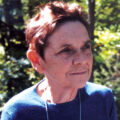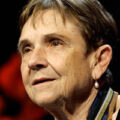Syntax as Power: The Legacy of Adrienne Rich
The Critical Flame’s invitation to write on Adrienne Rich has pushed me to a long overdue assessment of what her poetry once meant to me and how it stacks up now, now that the urgencies that produced much of it have receded into the historical record. I was delighted to discover, or rediscover, how fresh and intelligent most of her poetry still seems. I think this is largely because she had so mastered the possibilities of intricate syntax that she could establish a noteworthy stability for her passions. Rich is for me the poet after WWII who shows most fully how it is possible to “love with all our intelligence,” so that intelligence and love manage to sustain each other, even in a culture where those two values seem inextricably at odds with one another. Like Yeats, Rich can produce in syntactic intensity the sense of person necessary to make modes of choosing identities substantial and exemplary.
For brevity’s sake, I will concentrate on three poems that celebrate that syntactic power by emphasizing the self-referential deictic “this,” to call attention to the union between the how of the saying with what can be said because of such mastery. It virtually goes without saying that if one can focus attention on the work “this” does, one can also make an argument for the continuing force of the deictic, even as culture changes and references dissipate in time. Poetry endures largely by the power to preserve “this” against all the “that’s” and “maybe’s” that comprise much of our shifting social realities.
Many of Rich’s readers have come to dislike the politics of her early poem “An Unsaid Word.” But I think they rush too quickly to judgment without really hearing the work the syntax is doing to define the choice in terms of competing affective pulls that the poem completely understands and makes visible:
She who has the power to call her man
From that estranged intensity
Where his mind forages alone
Yet keeps her peace and leaves him free,
And when his thoughts to her return
Stands where he left her, still his own,
Knows this the hardest thing to learn.
“This” does not refer only to learning to “stand where he left her, still his own.” Rather, it refers to the whole sequence of subordination and complementation that the syntax undergoes as a manifestation of the complexity of thought sustaining this decision. Implicitly this single complex sentence also confirms that the speaker has the kind of power capable of calling her man, but also the kind of power to maintain an identity that preserves both independence and willed subservience.
Just notice the artistry here, as Rich constructs an action that serves as sustenance for identity claims. “She” is immediately modified by a relative clause, requiring the strong adverbial modifier of line three and the “yet” clause of the next line. Then the incompleteness of that clause produces a second relative clause modifying “She” and producing the moment of deference to him that the main verb both confirms and qualifies. The movement from the physical act of standing to the condition of knowing enacts both the contradiction facing the woman and the terms of her triumph. And it is the suspended syntactic sequence that establishes the range of identifications defining the woman’s capacity for clear affirmation of the role she thinks he is committed to playing.
Complex syntax affords more joyous roles for intelligence later in Rich’s career, but it is still necessary to provide realism and dignity for how the speaker comes to define joy. My favorite poem of Rich’s is “(The Floating Poem Unnumbered),” at the middle of Twenty-one Love Poems, not incidentally because it is so gender specific that its mode of attention and self-gathering seems to me easily transposed and universalized:
Whatever happens with us, your body
will haunt mine—tender, delicate
your lovemaking, like the half-curled frond
of the fiddlehead fern in forests
just washed by sun. Your traveled, generous thighs
between which my whole face has come and come—
the innocence and wisdom of the place my tongue has found there—
the live, insatiate dance of your nipples in my mouth—
your touch on me, firm, protective, searching
me out, your strong tongue and slender fingers
reaching where I have been waiting for years for you
in my rose-wet cave—whatever happens, this is.
Where “An Unsaid Word” depends on complex, internally varied clausal connections for its strength, here in “(The Floating Poem Unnumbered)” apposition takes over. Apposition proves an extremely generous and generative form of developing implications for the opening statement. First the body generates appositions with “tender, delicate lovemakings” that evoke simile in sound and in sense. Then whole clauses and extended phrases mount up, to be summarized by touch that in turn returns to adjectival apposition as celebrations of total affect. The poem’s most satisfying move is its marvelously rendered change at the end, from the speaker being the subject who makes love to becoming the grateful object discovering the “reach” of her lover’s capacity to discover her most fundamental longing. That kind of satisfaction escapes from history—its physical being marked and markable only by the deictic floating that lets the poem play over and over, never losing an iota of its intelligence or its capacity for passion.
The final love poem in the sequence is more ambitious yet. It takes place in the mind, where a different kind of timelessness can be established by clear-eyed choice:
… And this is not Stonehenge
simply nor any place but the mind
casting back to where her solitude,
shared, could be chosen without loneliness,
not easily nor without pains to stake out
the circle, the heavy shadows, the great light.
I choose to be a figure in that light,
half-blotted by darkness, something moving
across that space, the color of stone
greeting the moon, yet more than stone:
a woman. I choose to walk here. And to draw this circle.
The circle is and is not Stonehenge, is and is not a pure product of mind. Pure products of mind are likely to be lonely. This circle includes the one who allows her to feel her solitude is shared, since she makes it possible to choose to draw the circle that encloses the lovers and protects the sharing of solitude. The stress on choosing requires a different kind of syntax from the other poems we have discussed—first a series of defining clauses specifying the choice, then repetitions of the choosing in increasingly brief utterances that eliminate all possible accidents as irrelevant to the kind of identity that the series of love poems can establish.
Making as finding was a fundamental ideal of Modernist art and poetry. Making and choosing, and making as choosing, seem an even richer way to celebrate what the work reflected in syntax can accomplish. There may be no American poet after WWII better than Rich at realizing complex emotions as if they constituted permanently stable features of a mobile mental landscape.
About Charles Altieri
Charles Altieri is professor of literature at the University of California, Berkley, and author of several volumes of criticism, including Wallace Stevens and the Demands of Modernity: Toward a Phenomenology of Value and Subjective Agency: A Theory of First-Person Expressivity and its Social Implications.






